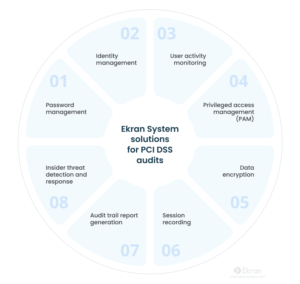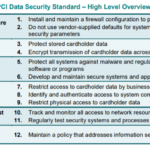In the ever-evolving landscape of cybersecurity, one cannot overlook the critical role served by a Qualified Security Assessor (QSA) in ensuring Payment Card Industry-Data Security Standard (PCI-DSS) compliance. This article explores the depth of a QSA’s role and their profound significance in upholding the security standards necessary for businesses to securely handle cardholder information. Grasping this fundamental understanding of these cybersecurity professionals, you will be able to appreciate their indispensability in the PCI-DSS ecosystem.
Understanding PCI-DSS Compliance
Payment Card Industry Data Security Standard (PCI-DSS) compliance is a set of rules and regulations meant to ensure businesses protect the cardholder’s data. Achieving PCI-DSS compliance signifies that your company has reached a defined set of security standards aimed at creating a secure and safe transaction environment for customers.
Concept and importance of PCI-DSS Compliance
PCI-DSS is a set of comprehensive standards established by the major credit card companies, meant to secure and protect credit card transactions in the business world. Adherence to these standards is highly important as it assures customers that their sensitive cardholder data is handled securely, maintaining their trust. Moreover, PCI-DSS compliance mitigates potential data breach threats and related financial implications.
Major components and objectives of PCI-DSS
PCI-DSS consists of twelve major requirements sorted into six categories: building and maintaining a secure network, protecting cardholder data, maintaining a vulnerability management program, implementing robust access control measures, regularly monitoring and testing networks, and maintaining an information security policy. The main objective of these components is to safeguard customers’ cardholder data.
Who needs to comply with PCI-DSS
Any business, regardless of size or volume of transactions, that accepts, transmits, or stores cardholder data is required to comply with PCI-DSS. This includes e-commerce businesses, brick-and-mortar stores, and even B2B companies.
Penalties/barriers for non-compliance to PCI-DSS
Non-compliance to PCI-DSS can result in severe penalties including heavy fines, increased transaction fees, and the potential loss of the ability to process credit card payments. Noncompliance can also harm the reputation of your business, leading to a loss of customers’ trust and decreased sales.
Defining a Qualified Security Assessor (QSA)
What is a QSA
A Qualified Security Assessor (QSA) is a professional accredited by the PCI Security Standards Council to audit merchants for PCI-DSS compliance.
Roles and responsibilities of a QSA
The primary role of a QSA is to assist businesses in achieving and maintaining PCI-DSS compliance. This includes conducting on-site audits, identifying vulnerabilities, recommending changes, and producing formal compliance reports.
Qualifications and Certifications required to be a QSA
To become a QSA, an individual must hold a high level of information security and audit experience, and undergo comprehensive PCI training. QSAs must also pass the PCI QSA Examination and maintain their QSA status with continuous learning and industry involvement.
How to become a QSA
Becoming a QSA requires meeting specific qualifications, gaining relevant experience, attending PCI training programs, passing the PCI QSA exam, and applying for QSA certification.
The Role of a QSA in PCI-DSS Compliance
Importance of a QSA in ensuring PCI-DSS compliance
A QSA is instrumental in ensuring PCI-DSS compliance. They provide expert guidance, recommend security measures, and perform rigorous audits to affirm compliance status.
Tasks of a QSA in facilitating PCI-DSS compliance
QSAs conduct comprehensive audits, consult on PCI-DSS policies and procedures, identify and address security gaps, and provide guidance on maintaining continuous compliance.
Engaging a QSA: When and Why?
Engaging a QSA is crucial when an organization intends to attain or confirm their PCI-DSS compliance. QSAs use their security and audit expertise to validate compliance status, making them valuable assets for any business handling cardholder data.

QSA’s Process of Assessing PCI-DSS Compliance
Understanding the Assessment process
The assessment process involves reviewing the organization’s cardholder data environment, scrutinizing security policies and procedures, conducting vulnerability scans and penetration testing, and evaluating the effectiveness of security controls.
Scope of the Assessment
The assessment covers all systems and processes related to cardholder data, including network devices, servers, applications, policies, procedures, and even third-party services.
Techniques and tools used by QSAs in Assessment
QSAs use a wide range of techniques for assessment including interviews, observation, document reviews, and technical verification. QSAs also use various security testing tools for vulnerability scanning and penetration testing.
Conducting On-site Audits
Preparation for the audit
QSAs prepare for the audit by reviewing the scope, requesting necessary documentation, and familiarizing with the business’ technical and operational environment.
Key areas of focus during on-site audits by QSA
QSAs focus on areas such as network security, data protection, vulnerability management, access control, monitoring and testing procedures, and information security policies.
How QSAs conduct on-site audits
On-site audits typically involve physical inspection of the systems, interviews with key personnel, technical testing, and verification of policies and procedures.
Post-Audit activities and responsibilities of QSAs
After the audit, QSAs analyze the findings, document the results, provide recommendations, and produce a final report of compliance (RoC).
Producing Compliance Reports
Significance of Compliance Reports
Compliance reports are vital as they validate the PCI-DSS compliance status of an organization to both internal stakeholders and outside entities, like acquirers and card brands.
Key elements of a QSA’s Compliance Report
A QSA’s compliance report includes details about the audit findings, remediation recommendations, and the final compliance status.
The role of QSAs in communicating these reports to businesses
QSAs communicate the reports to businesses and explain the findings and recommendations, ensuring the business understands their current compliance status and the steps needed for ongoing adherence.
Continuous Compliance Monitoring
Why continuous compliance monitoring is essential
Continuous compliance monitoring is essential to identify changes in the environment that may impact compliance, and to ensure ongoing adherence to PCI-DSS.
Role of QSA in continuous compliance monitoring
QSAs can assist businesses in establishing continuous monitoring processes and provide advice on dealing with identified risks or vulnerabilities.
How QSAs use risk management strategies for continuous monitoring
QSAs use risk management strategies to analyze potential threats and vulnerabilities, assess the risks associated, and provide recommendations to mitigate those risks.
How QSAs Address Compliance Challenges
Common challenges in achieving PCI-DSS compliance
Achieving PCI-DSS compliance can be challenging due to factors like the complexity of the standard, resource constraints, and technological changes.
How QSAs help organizations overcome these challenges
QSAs help businesses overcome these challenges by providing expert guidance, recommending efficient solutions, and maintaining a proactive approach to change and risk management.
Evaluating the Performance of a QSA
Benefits of regular QSA evaluation
Regular evaluation of a QSA helps ensure that the QSA is performing effectively and maintaining their knowledge and skills to meet the evolving requirements of PCI-DSS.
Common KPIs for QSA performance
Common KPIs for QSA performance include the accuracy and thoroughness of audits, timeliness of engagements, communication effectiveness, and customer satisfaction.
How to conduct a QSA performance review
A QSA performance review can be conducted by gathering feedback from internal teams, evaluating the QSA’s adherence to PCI Standards, and comparing their performance against the established KPIs.
Case study: Effectiveness of QSAs
Role of QSAs in maintaining PCI compliance for established businesses
QSAs play a crucial role in maintaining PCI compliance for established businesses by conducting regular audits, monitoring security controls, and providing necessary updates on PCI-DSS requirements.
Success stories of businesses that benefitted from hiring a QSA
There are numerous success stories of businesses that have greatly benefitted from hiring a QSA. These businesses highlight how QSAs helped them achieve and maintain PCI-DSS compliance, protect their customers’ data, and manage their reputation and trust in the market.












[…] 1 compliance, entities are required to undergo an annual on-site PCI Data Security Assessment by a Qualified Security Assessor (QSA) or a firm-specific Internal Security Assessor (ISA). Additionally, they must conduct a quarterly […]